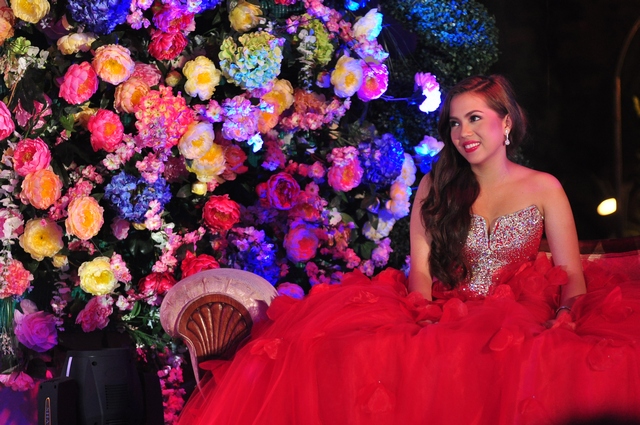
Another tradition that can be heard at Filipino weddings is the toast of “Mabuhay,” which means “long life.” This enthusiastic toast is done three times (“trinity”) for the couple in hopes of granting them a long lasting and blessed marriage. The money dance represents good fortune for the couple and is also a means of helping the couple financially as they begin their life together. Male guests line up to pin money on the bride’s dress or veil and female guests line up to pin money on the groom’s clothing. The money dance is the most famous Filipino wedding tradition in Hawaii that even non-Filipinos are adopting it. Finally, the candle sponsors present the bride and groom with these items as a symbol of unity. Cord sponsors place the “yugal” (cord) over the veil as a representation of the couple’s bond and union. The veil sponsors drape a white veil over the bride’s head and on the groom’s shoulders as a symbol of protection. The Coin sponsors carry 13 “arras” (coins in a pouch that represent Jesus and His 12 Apostles) and bring them to the altar as a representation of the couple taking care of each other financially. The number of sponsors varies for the Filipino couple, but there are typically four sets of secondary sponsors, including coin sponsors, veil sponsors and candle sponsors, and can be anyone from family members to friends. At a Catholic wedding ceremony, sponsors are significant members of the bridal party. She also has 18 candles for 18 wishes as well as 18 roses presented to her. The debutante has a group of 17 friends to complete her court and they have a specially choreographed waltz, preceded by a father-daughter dance. On a Filipina’s 18th birthday, some of the wealthier families celebrate the young lady’s adulthood at a “debut” (cotillion), which is a grand birthday celebration similar to a quinceañera or Sweet 16. This reflects the Filipinos’ value of family, including an extended family relationship. For the baptism ceremony, a “ninong” and “ninang” are selected as the child’s godfather and godmother, respectively. Catholic Filipinos usually baptize their baby to coincide with the 1st birthday. 
“Pasalubong” in Tagalog is the tradition of travelers bringing gifts, such as souvenirs and native snacks, to share with people back home. When they go on a trip, they prepare “pasalubong” for their family and friends. “Tito” and ‘”Tita” refer to the uncle and auntie in the Filipino culture (but remember to only use it when the person is a younger brother or sister of the parents). Similarly, “Kuya” and “Ate” are used in Tagalog to address an older brother amongst siblings and can also address a stranger that is older than the speaker.

“Manong” and “Manang” are Ilocano titles given to the first-born male and female of the family. “Lolo” (grandfather) and “Lola” (grandmother) can sometimes be used to address other Filipino elders in general. Titles of respect are given to elders.When a younger person does “mano po”, he/she takes the elder’s right hand and places it on his/her forehead, followed by a slight bow. “Mano po” translates to “hand” in Spanish “po” in Filipino speech is used to express respect. Younger Filipinos practice “mano po” to elders.


Elders are very respected in the Filipino family for their wisdom and life experiences.Filipinos attend mass or church services where they can celebrate their faith with a community of believers. Faith is a very important aspect of Filipinos’ everyday life, but Sundays are especially dedicated to the Lord.








 0 kommentar(er)
0 kommentar(er)
